List of Russian flags
Flag of the Russian Federation
| Flag | Symbol | Date | Use | Description |
|---|---|---|---|---|
 | 1705–1920; 1993–present |
State flag of Russia | A tricolour consisting of three equal horizontal fields, white on the top, blue in the middle and red on the bottom. Used as a commercial and civil maritime ensign from the 1690s (allegedly from 1668) on. Since 1700, tricolor has been used as the flag of the Tsar of Moscow by Peter the Great. Also this flag was a national trade and it was raised on Russian merchant ships.[1] It existed before the introduction in 1858 of a black-yellow-white tricolor. Since 1896, it again became the national flag of the Russian Empire.[2][3] It was also used by the Russian state during the Civil War in Russia. |
Flags of the Armed Forces of the Russian Federation
A majority of the flags of the Russian Armed Forces mimic the flag designs of the Imperial Russian Army and Navy, while some flags are directly based on Soviet era flags. Most notably, the flag of the Russian Airborne troops is based on the flag of the Soviet Airborne troops, and the flag of the Russian Aerospace forces is based on the Soviet Air Force flag. Many Russian military flags and regiment banners employ the Cross of Saint George within their design, which was heavily in use by the Imperial Russia Army up to the early 20th century. These military banners shared many similarities to the regiment banners of the Prussian Army, which in some cases looked almost identical to each other. Around 2006, many traditional Russian banners replaced Soviet era regiment banners in favor of moving away from Communist oriented iconography.
Flags of service branches
| Flag | Date | Use | Description |
|---|---|---|---|
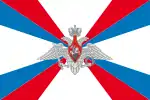 | 2003–present | Flag of the Ministry of Defence | |
 | 2004–present | Flag of the Russian Ground Forces | |
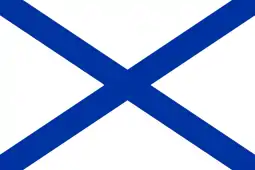 | 1712–1917 | Ensign of the Imperial Russian Navy | A dark blue saltire on a white field. The so-called Andreevskiy (St. Andrew's) flag was inspired by the flag of Scotland and was designed by Peter the Great in need of a naval flag for the newly created Russian Navy. |
| 2000–present | Ensign of the modern day Russian Navy | The ensign of the imperial Russian Navy was revived in 2000 for usage in the modern day Russian Navy. The previous variant of the ensign was revived in 1992, but in a light blue color that did not conform to the historical specifications of the original. It was finally decided on December 29, 2000, to update all existing flags to the original dark blue, rather than the light blue. | |
 | 2015–present | Flag of the Russian Aerospace Forces | |
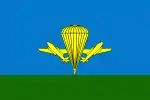 | 2004–present | Flag of the Russian Airborne Forces | A bicolour of horizontal stripes, blue and green defaced with the Russian Airborne Forces emblem |
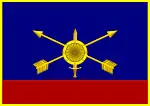 | 2004–present | Flag of the Strategic Missile Forces |
Flags of the Ground Forces
Flags of the arms of the Ground Forces of the Russian Federation
| Flag | Date | Use | Description |
|---|---|---|---|
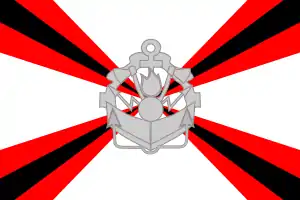 | 2005–present | Flag of the Engineer Troops | |
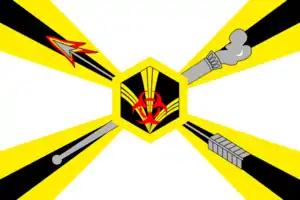 | 2005–present | Flag of the Nuclear, Biological and Chemical Protection Troops of the Russian Armed Forces | |
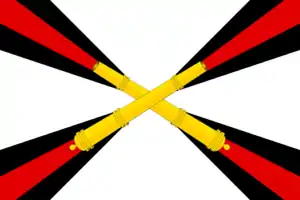 | 2006–present | Flag of the Missile troops and artillery of the Russian Federation | |
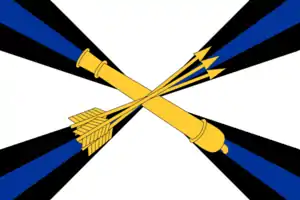 | 2007–present | Flag of the Air Defence Troops of the Russian Ground Forces | |
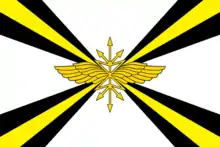 | 2007–present | Flag of the Communication Troops of the Armed Forces of the Russian Federation |
Flags of the Aerospace Forces
The Aerospace Forces are a branch of the Armed Forces of the Russian Federation, it has three arms, the Russian Air Force, the Air Defense Forces, and the Russian Space Forces. The Air Defense Forces does not have a flag.
| Flag | Date | Use | Description |
|---|---|---|---|
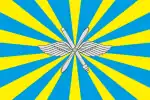 | 2004–present | Flag of the Russian Air Force | |
 | 2015–present | Flag of the Russian Space Forces |
Flags of the Rear of the Russian Armed Forces (1992–2010)
| Flag | Date | Use | Description |
|---|---|---|---|
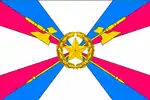 | 2004–2009 | Flag of the Rear of the Armed Forces of the Russian Federation | |
 | 2005–2011 | Flag of military units and organizations of cantonment and military equipment |
Military district flags
| Flag | Date | Use | Description |
|---|---|---|---|
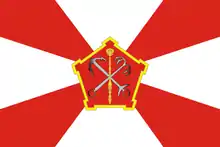 | 2016–present | Flag of Western Military District | |
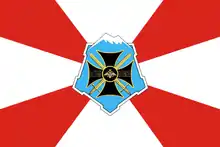 | 2016–present | Flag of Southern Military District | |
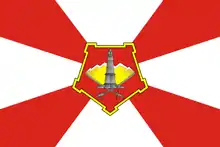 | 2016–present | Flag of Central Military District | |
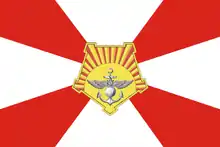 | 2016–present | Flag of Eastern Military District |
Banners of the Armed Forces of the Russian Federation
Each branch of the Armed Forces has a representative banner, one for the Ground Forces, the Aerospace Forces, the Navy, and one to represent the entire Armed Forces as a whole.
| Obverse (Front) | Reverse (Back) | Date | Use | Description |
|---|---|---|---|---|
.svg.png.webp) | .svg.png.webp) | 2000–2003 | Banner of the Armed Forces of the Russian Federation | The first banner of the Armed Forces of the Russian Federation was introduced on 8 December 2000, later confirmed by Federation Council on 20 December and signed by Vladimir Putin on 29 December. It was a plain red field, it symbolized the traditional red color of the Armed Forces of the Soviet Union. |
.svg.png.webp) | .svg.png.webp) | 2003–present | Banner of the Armed Forces of the Russian Federation | The present banner of the Armed Forces of Russian Federation is introduced under a resolution by State Duma in June 2003. This banner consists of two double-headed eagles, on the obverse side is the coat of arms of the Russian Federation, and on the reverse side is the middle emblem of the armed forces of the Russian Federation. The banner follows the principles and format of historically older Russian military flags that were last used prior to the Russian Revolution in 1917. It also contains four stars in each corner of the banner to symbolize the heritage of the Soviet Armed Forces. The reverse side also contains two pieces of text written in old style Slavic typeface, the top side of the banner contains the inscription "Fatherland" ("Отечество") and on the bottom side the inscription reads "Debt of Honor" ("Долг Честь")[4] |
.svg.png.webp) | .svg.png.webp) | 2002–present | Banner of the Russian Ground Forces | The banner of the Russian Ground Forces was introduced by decree No. 141 on February 4, 2002 by Vladimir Putin. It is similar to the above banner, but doesn't have stars and texts, on the reverse side is the middle emblem of the Russian Ground Forces. |
 |  | 2002–present | Banner of the Russian Air Force/Aerospace Forces | The banner of the Russian Air Forces was introduced by decree No. 141 on February 4, 2002 by Vladimir Putin.[5] It became the banner of the newly created Aerospace Forces branch, which saw the merger between the Russian Air Forces and the Air Defence Forces on August 1, 2015. |
 |  | 2000–present | Banner of the Russian Navy | The ensign of the Russian Navy is used as the banner of the Russian Navy. On December 29, 2000, Russian President Vladimir Putin signed a federal law making the naval ensign of the Russian navy the official banner of the Russian Navy.[6] |
Victory Banner
The Victory Banner was a historical banner raised atop of the Reichstag building in Berlin, by the Red Army, on May 1, 1945. It signified the victory over Nazi Germany, and served as the main symbol of victory of the Soviet people. It was amended in Russian law in 1996, but with a new design to distance the new Russian state from any usage of Communist iconography. In 2007, following pressure from Red Army veterans, the original Victory Banner design replaced the 1996 variant, and has since then served its usage in virtually every single Victory Day parade held across Russia.
| Banner | Date | Use | Description |
|---|---|---|---|
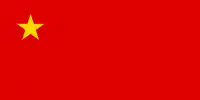 | 1996–2007 | The Symbol of Victory Banner was an alternative to using the historic Victory Banner, which contained the hammer and sickle. | |
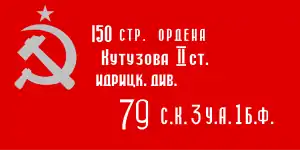 | 2007–present | The Banner of Victory raised on the Reichstag in 1945. Replicas of the Victory Banner can be used alongside the national flag on Victory Day. |
Command Standards
| Standard | Date | Use | Description |
|---|---|---|---|
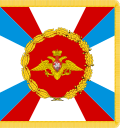 | 2003–present | Standard of the Minister of Defence | |
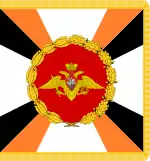 | –present | Standard of the Chief of the General Staff | |
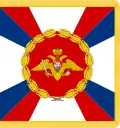 | –present | Standard of the Commander-in-Chief of the Russian Ground Forces | |
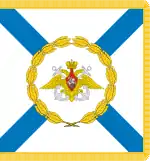 | –present | Standard of the Commander-in-Chief of the Russian Navy | |
 | 2015–present | Standard of the Commander-in-Chief of the Aerospace Forces | |
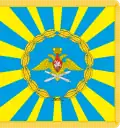 | –present | Standard of the Commander of the Air Force – Deputy Commander-in-Chief of the Aerospace Forces | |
 | –present | Standard of the Commander of the Strategic Missile Forces | |
 | –present | Standard of the Commander of the Space Forces | |
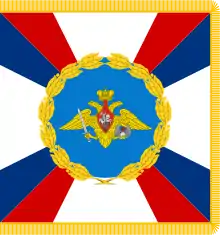 | –present | Standard of the Commander of the Airborne Forces |
Flags of paramilitary organizations
| Flag | Date | Use | Description |
|---|---|---|---|
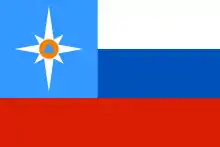 | 1992–present | Flag of the Ministry of Emergency Situations | |
.svg.png.webp) | 1992–present | Departmental flag of the Ministry of Emergency Situations | |
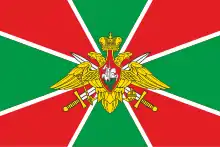 | 2003–present | Flag of the Border Service of the Federal Security Service | |
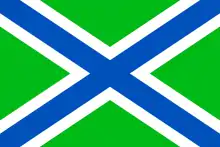 | 2008–present | Ensign of the Russian Coast Guard | |
 | 1827-1871 | Flag of the Customs Service of the Russian Empire | |
| 1994–present | Flag of the Federal Customs Service of the Russian Federation | ||
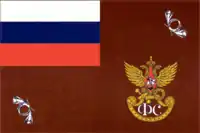 | 2001–present | Flag of the Courier Service of the Russian Federation (GFS) | |
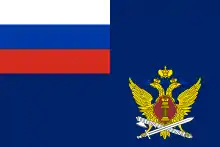 | 2005–present | Flag of Federal Penitentiary Service | |
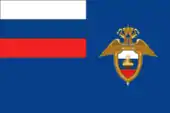 | Flag of the Main Directorate of Special Programs of the President of the Russian Federation | ||
 | 2008 | Flag of the Office of the Prosecutor General of Russia | |
 | Flag of Investigative Committee of Russia | ||
 | 2006–present | Flag of Federal service of bailiffs | |
.svg.png.webp) | Flag of the Ministry of Internal Affairs of the Russian Federation | ||
 | 2007–2016 | Flag of Federal Migration Service of Russia | |
 | 2000–2016 | Flag of the Federal service of special construction of the Russian Federation |
Flags of special services
| Flag | Date | Use | Description |
|---|---|---|---|
 | 2001–2003 | Flag of Federal agency of the governmental communication and the information at the President of the Russian Federation | |
 | 2002–present | Flag of the Federal Protective Service | |
 | 2010–present | Flag of the Federal Security Service of the Russian Federation | |
 | 2009–present | Flag of Foreign Intelligence Service | |
 | 2015–2016 | Flag of the Internal Troops of Russia | |
 | 2016–present | Flag of National Guard Forces Command | |
 | 2016–present | Flag of the National Guard of Russia | |
Historical flags of Russia
| Flag | Date | Use | Description |
|---|---|---|---|
.svg.png.webp) | 1668–1693 | Ensign of the ship Oryol | First naval flag of the Tsardom of Russia. |
.svg.png.webp) | 1693–1700 | Flag of the Tsar of Russia | |
 | 1705–1917 | Merchant flag | Peter the Great's tricolour was the merchant flag of the Russian Empire. However, the flags used by the Russian Army were regimental flags with the Double-Headed Eagle, the official Imperial symbol, in the centre. The Imperial Standard was the black Double-Headed Eagle displayed on a golden banner, represented the Empire and the Emperor, the absolute ruler of Russia. [7] When the black-yellow-white flag was in use between 1858 and 1896, the red-blue-white flag was still used as a merchant ensign.[7] |
.svg.png.webp) | 1858–1896 | First official State Flag of the Russian Empire and Flag for "Celebrations"[8][9][10][11][12] | On June 11, 1858, by the decree of Alexander II, the heraldic colors of the empire were approved for flags, banners and other items (draperies, rosettes, etc.). It became the national flag in 1865. The white-blue-red flag was reintroduced in 1883 but the black-yellow-white remained in use until it was fully replaced by in all circumstances in 1896. |
 | 1883–1917 | National flag | On April 28, 1883, Alexander III amended the 1858 decree to be replaced exclusively with the white-blue-red colours. This meant that the white-blue-red flag was now to be used on land in addition to at seas. It fully replaced the black-yellow-white flag when it became the only official National flag in time for the coronation of Nicholas II in 1896. |
| 1917–1920 | The Russian Provisional Government and the Russian Republic kept using the same flag after the monarchy was overthrown in the February Revolution. During the Russian Civil War, it was also used by Admiral Kolchak's Russian State and the White movement overall. | ||
.svg.png.webp) | 1914–1917 | Flag for private use; also planned national flag | A tricolour of horizontal stripes, white, blue and red, with a yellow canton with the coat of arms. |
.svg.png.webp) | 1917–1918 | First flag of the Russian SFSR | The first flag of the RSFSR features white text on a red field that is written in pre-revolutionary Russian orthography. The text on the flag also uses the first name of the RSFSR, in which during its early years as a sovereign state, it was then known at the time as the Russian Socialist Federative Soviet Republic, but not as the Russian Soviet Federative Socialist Republic as it was well known for much of its existence. |
.svg.png.webp) | 1918–1937 | Second flag of the Russian SFSR | Red banner with stylized "RSFSR" abbreviation in gold Cyrillic letters in the golden bordered honour canton |
.svg.png.webp) | 1937–1954 | Third flag of the Russian SFSR | Red banner with stylized "RSFSR" abbreviation in gold Cyrillic letters in the honour canton |
.svg.png.webp) | 1954–1991 | Fourth flag of the Russian SFSR | The flag of the Soviet Union with a blue band at the hoist |
.svg.png.webp) | 1991 | Fifth flag of the Russian SFSR | Flag of Russian SFSR from 1 November 1991 (de facto from 22 August 1991, after the August Putsch) to 25 December 1991 |
| 1991–1993 | First flag of the Russian Federation | National flag of the Russian Federation from 25 December 1991 to 11 December 1993, when it was replaced by the present version | |
 | 1993–present | Second flag of the Russian Federation | The current flag of Russia is the second flag in the Russian Federation's history, it subsequently replaced the first flag of the Russian Federation, which was a modified variant of the first civil flag of Russia. The current flag of the Russian Federation revived the historical tri-color flag of the Tsardom of Russia after 288 years since its inception as the first civil flag of Russia. Its usage was discarded and even illegal after the Bolsheviks took control of Russia in 1917. However, during the Russian Civil War, the tri-color continued its usage by the Russian White Movement and White army until their defeat in 1923. The tri-color became a symbol of opposition, and a relic of tsarist rule, and thus it was punishable to wield the tri-color in public. During perestroika, the tri-color was no longer a punishable offense, and its usage was used by opposition parties and democratic movements prior to the collapse of the Soviet Union. |
Historical banners of Russia
| Banner | Date | Use | Description |
|---|---|---|---|
.svg.png.webp) |
c. 1385 | Banner of the Novgorod Republic | Banner used by the Novgorod Republic, depicting a white castle on a red field. |
 |
c. 1400 | Banner of the Principality of Polotsk | Reconstructed banner used by Polotsk in the Battle of Grunwald (1410) as a part of Lithuania. |
 |
1552 | Banner of the Russian Tsardom | Banner used by Ivan IV during the Siege of Kazan. |
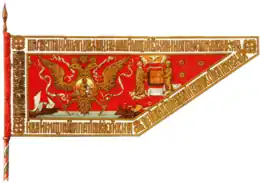 | 1696 | Armorial Banner of Peter the Great | The armorial banner of Peter the Great was created in 1696. Made from red taffeta with a white border, the banner depicted a golden eagle hovering over the sea. On the chest of the eagle in the circle is the Savior, next to the Holy Spirit and the holy apostles Peter and Paul. The banner was likely made for the second Azov campaign. |
Historical standards of Russia
| Standard | Date | Use | Description |
|---|---|---|---|
 | 1703–1917 | Imperial Standard at sea | The Standard of the Tsar of Russia at sea, adopted under the rule of Peter the Great.[13][14] |
 | c. 1835 | Imperial Standard on land | In the album of flags of 1835, an Imperial Standard used at palaces was reported.[13] |
.svg.png.webp) | 1858–1917 | Imperial Standard on land | Standard of the Tsar of Russia on land, adopted in 1858.[13][14] |
.png.webp) | 1991 | Presidential Standard (unofficial) | De facto unofficial Standard of the President of the Russian Soviet Federative Socialist Republic, used during the inauguration of Boris Yeltsin on July 10, 1991.[15][16] |
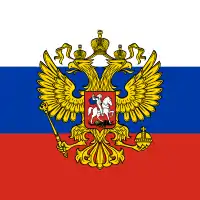 | 1994–present | Presidential Standard | Current Presidential Standard of the Russian Federation. |
Flags of Russian cities
| Flag | Date | Use | Description |
|---|---|---|---|
 | 1997–present | Flag of Astrakhan | |
 | 1995–present | Flag of Barnaul | The arms of the city of Barnaul on a blue background. |
 | 2002–present | Flag of Chelyabinsk | |
.svg.png.webp) | 2002–present | Flag of Cherepovets | A blue pall on a golden background. |
.svg.png.webp) | 1996–present | Flag of Irkutsk | |
.png.webp) | 2003–present | Flag of Ivanovo | |
.svg.png.webp) | 2000–present | Flag of Izhevsk | |
 | 1996–present | Flag of Kaliningrad | |
 | 2000–present | Flag of Kaluga | |
.png.webp) | 2004–present | Flag of Kazan | |
.png.webp) | 2010–present | Flag of Kirov | |
_(2006).png.webp) | 2006–present | Flag of Krasnodar | |
.png.webp) | 1995–present | Flag of Krasnoyarsk | |
 | 2000–present | Flag of Kursk | |
.svg.png.webp) | 2004–present | Flag of Magnitogorsk | A black triangle on a silver‐colored background. |
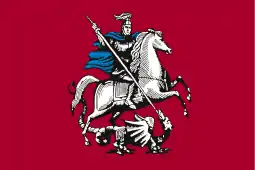 | 1995–present | Flag of Moscow | |
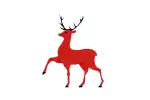 | 2006–present | Flag of Nizhny Novgorod | |
.png.webp) | 2006–present | Flag of Nizhny Tagil | |
.png.webp) | Flag of Norilsk | ||
 | Flag of Novokuznetsk | ||
 | Flag of Novosibirsk | ||
 | Flag of Omsk | ||
 | Flag of Orenburg | ||
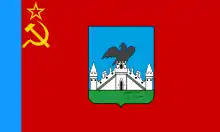 | Flag of Oryol | ||
 | Flag of Perm | ||
.png.webp) | Flag of Petropavlovsk-Kamchatsky | ||
.png.webp) | Flag of Petrozavodsk | ||
.png.webp) | Flag of Pskov | ||
 | Flag of Rostov-on-Don | ||
.png.webp) | Flag of Ryazan | ||
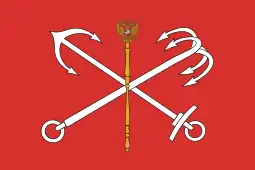 | 1992–present | Flag of St Petersburg | |
 | Flag of Samara | ||
 | Flag of Saratov | ||
.png.webp) | Flag of Sergiyev Posad | ||
 | Flag of Stavropol | ||
.png.webp) | Flag of Sochi | ||
.png.webp) | Flag of Suzdal | ||
.png.webp) | Flag of Tolyatti | ||
 | Flag of Tomsk | ||
 | Flag of Tula | ||
 | Flag of Tver | ||
 | Flag of Ufa | ||
.png.webp) | Flag of Ulan-Ude | ||
 | Flag of Ulyanovsk | A vertical triband of blue, white, and blue, with a golden crown in the middle of the white stripe. | |
 | Flag of Veliky Novgorod | ||
 | Flag of Vladimir | ||
 | Flag of Vladivostok | ||
 | 1999–present | Flag of Volgograd | The arms of the city of Volgograd on a red background. |
 | Flag of Vologda | ||
 | Flag of Voronezh | ||
| Flag of Yakutsk | |||
 | 1996–present | Flag of Yaroslavl | The arms of the city of Yaroslavl on a blue background. |
.svg.png.webp) | Flag of Yekaterinburg |
Historical flags of the short-lived states during the Russian Civil War
| Flag | Date | Use | Description |
|---|---|---|---|
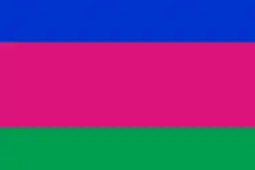 |
1918-1920 | Flag of the Kuban People's Republic | Flag of the short-lived Kuban People's Republic, an anti-Bolshevik Cossack state in the Kuban during the Russian Civil War. |
 |
1919-1920 | Flag of South Russia | Flag of so-called South Russia, a short-lived anti-Bolshevik military state under the Armed Forces of South Russia led by General Anton Denikin during the Russian Civil War. |
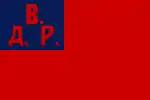 | 1920–1922 | Flag of the Far Eastern Republic | Flag of the short lived Far Eastern Republic, a puppet state of the Russian Socialist Federative Soviet Republic. It later merged with the RSFSR on November 15, 1922. |
Historical flags of the Soviet Union
| Flag | Date | Use | Description |
|---|---|---|---|
.svg.png.webp) | 1923 | First flag of the Soviet Union | The first flag of the Soviet Union is a red flag with the state emblem in the center and fimbriated in white. |
.svg.png.webp) | 1923–1924 | Second flag of the Soviet Union | The second flag of the Soviet Union with the golden fimbriated canton, adopted shortly after the end of the Russian Civil War. |
.svg.png.webp) | 1924–1936 | Third flag of the Soviet Union | The third flag of the Soviet Union. |
.svg.png.webp) | 1936–1955 | Fourth flag of the Soviet Union | The fourth flag of the Soviet Union, this design was prominently used during the Second World War. |
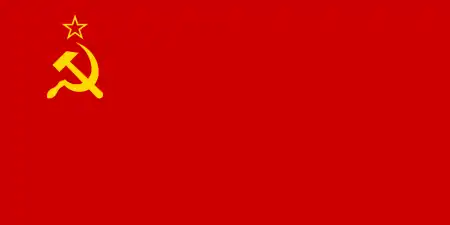 | 1955–1991 | Fifth flag of the Soviet Union | The fifth and final flag of the Soviet Union. |
See also
References
- Цвета Русского Государственного национального флага (in Russian).
- "Высочайшее повеление о признании во всех случаях бело-сине-красного флага национальным — Викитека". ru.wikisource.org (in Russian). Retrieved 2018-05-11.
- Свод морских постановлений. Книга десятая. Морской устав. Издание 1901 года. С.-Петербург: Типография Морского Министерства в Главном Адмиралтействе. 1902. pp. 340.
- http://www.vexillographia.ru/russia/index.htm
- http://sbornik-zakonov.ru/143556.html
- https://rg.ru/2000/12/29/znamena-dok.html
- "флаги Российской империи". www.vexillographia.ru.
- Bonnell, Victoria E. Russia at the barricades: eyewitness accounts of the August 1991 coup. M.E. Sharpe, 1994, p92
- Condee, Nancy. Soviet hieroglyphics: visual culture in late twentieth-century Russia. Indiana University Press, 1995, p49
- Saunders, Nicholas J. Matters of conflict: material culture, memory and the First World War. Routledge, 2004, p129
- National Museum of Science and Technology (Canada). Material history review. Canada Science and Technology Museum, 2000, p46
- "Russia, 1914-1917". www.crwflags.com.
- Russian Institute for Heraldry and Vexillology. "штандарты императорской семьи". www.vexillographia.ru. Retrieved 18 June 2019.
- "Tsar's personal flags". FOTW. CRWFLAGS. Retrieved 18 June 2019.
- "Как спасали Знамя РСФСР". rambler.ru. Retrieved 21 October 2019.
- "Первый президент России Борис Николаевич Ельцин принимает присягу (1991)". Ельцин Центр.
External links
 Media related to Flags of Russia at Wikimedia Commons
Media related to Flags of Russia at Wikimedia Commons- Flags of Russia: http://www.vexillographia.ru/russia/index.htm
